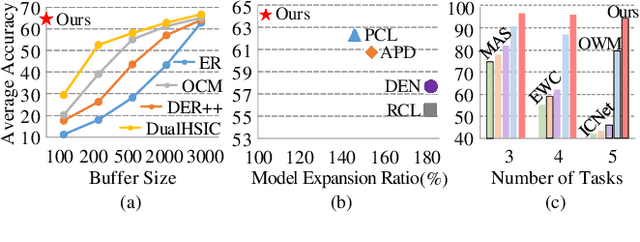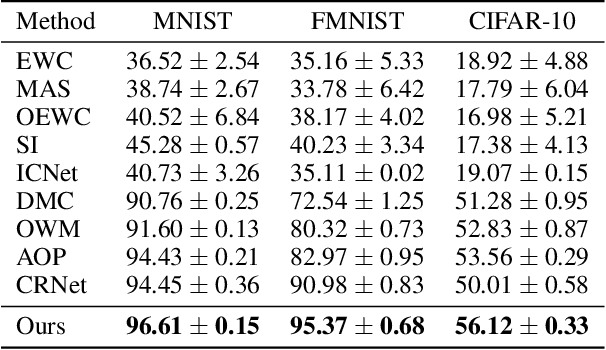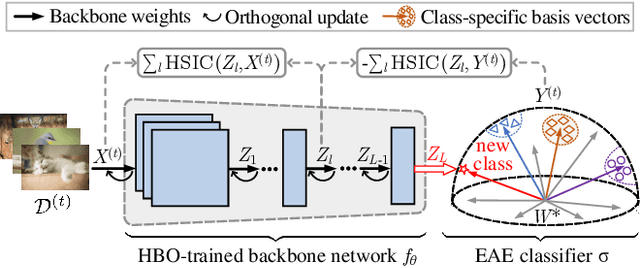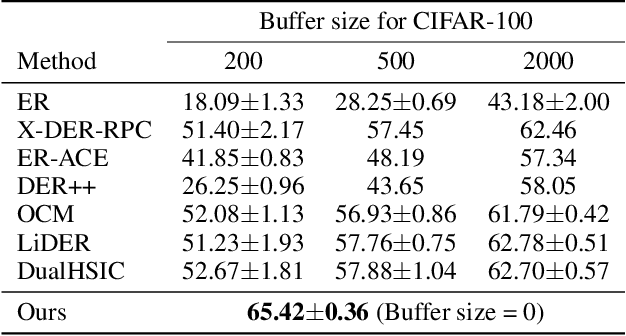Junwei Chen
Harnessing Neural Unit Dynamics for Effective and Scalable Class-Incremental Learning
Jun 04, 2024Abstract:Class-incremental learning (CIL) aims to train a model to learn new classes from non-stationary data streams without forgetting old ones. In this paper, we propose a new kind of connectionist model by tailoring neural unit dynamics that adapt the behavior of neural networks for CIL. In each training session, it introduces a supervisory mechanism to guide network expansion whose growth size is compactly commensurate with the intrinsic complexity of a newly arriving task. This constructs a near-minimal network while allowing the model to expand its capacity when cannot sufficiently hold new classes. At inference time, it automatically reactivates the required neural units to retrieve knowledge and leaves the remaining inactivated to prevent interference. We name our model AutoActivator, which is effective and scalable. To gain insights into the neural unit dynamics, we theoretically analyze the model's convergence property via a universal approximation theorem on learning sequential mappings, which is under-explored in the CIL community. Experiments show that our method achieves strong CIL performance in rehearsal-free and minimal-expansion settings with different backbones.
Towards Continual Learning Desiderata via HSIC-Bottleneck Orthogonalization and Equiangular Embedding
Jan 17, 2024



Abstract:Deep neural networks are susceptible to catastrophic forgetting when trained on sequential tasks. Various continual learning (CL) methods often rely on exemplar buffers or/and network expansion for balancing model stability and plasticity, which, however, compromises their practical value due to privacy and memory concerns. Instead, this paper considers a strict yet realistic setting, where the training data from previous tasks is unavailable and the model size remains relatively constant during sequential training. To achieve such desiderata, we propose a conceptually simple yet effective method that attributes forgetting to layer-wise parameter overwriting and the resulting decision boundary distortion. This is achieved by the synergy between two key components: HSIC-Bottleneck Orthogonalization (HBO) implements non-overwritten parameter updates mediated by Hilbert-Schmidt independence criterion in an orthogonal space and EquiAngular Embedding (EAE) enhances decision boundary adaptation between old and new tasks with predefined basis vectors. Extensive experiments demonstrate that our method achieves competitive accuracy performance, even with absolute superiority of zero exemplar buffer and 1.02x the base model.
Multi-View Class Incremental Learning
Jun 16, 2023



Abstract:Multi-view learning (MVL) has gained great success in integrating information from multiple perspectives of a dataset to improve downstream task performance. To make MVL methods more practical in an open-ended environment, this paper investigates a novel paradigm called multi-view class incremental learning (MVCIL), where a single model incrementally classifies new classes from a continual stream of views, requiring no access to earlier views of data. However, MVCIL is challenged by the catastrophic forgetting of old information and the interference with learning new concepts. To address this, we first develop a randomization-based representation learning technique serving for feature extraction to guarantee their separate view-optimal working states, during which multiple views belonging to a class are presented sequentially; Then, we integrate them one by one in the orthogonality fusion subspace spanned by the extracted features; Finally, we introduce selective weight consolidation for learning-without-forgetting decision-making while encountering new classes. Extensive experiments on synthetic and real-world datasets validate the effectiveness of our approach.
 Add to Chrome
Add to Chrome Add to Firefox
Add to Firefox Add to Edge
Add to Edge